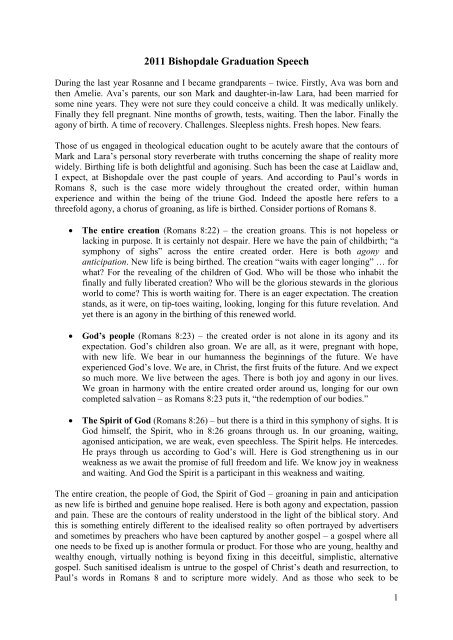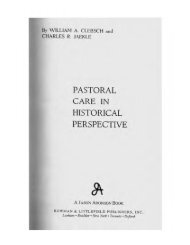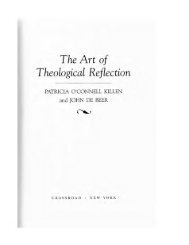Graduation Speech - Bishopdale Theological College
Graduation Speech - Bishopdale Theological College
Graduation Speech - Bishopdale Theological College
- No tags were found...
You also want an ePaper? Increase the reach of your titles
YUMPU automatically turns print PDFs into web optimized ePapers that Google loves.
2011 <strong>Bishopdale</strong> <strong>Graduation</strong> <strong>Speech</strong>During the last year Rosanne and I became grandparents – twice. Firstly, Ava was born andthen Amelie. Ava’s parents, our son Mark and daughter-in-law Lara, had been married forsome nine years. They were not sure they could conceive a child. It was medically unlikely.Finally they fell pregnant. Nine months of growth, tests, waiting. Then the labor. Finally theagony of birth. A time of recovery. Challenges. Sleepless nights. Fresh hopes. New fears.Those of us engaged in theological education ought to be acutely aware that the contours ofMark and Lara’s personal story reverberate with truths concerning the shape of reality morewidely. Birthing life is both delightful and agonising. Such has been the case at Laidlaw and,I expect, at <strong>Bishopdale</strong> over the past couple of years. And according to Paul’s words inRomans 8, such is the case more widely throughout the created order, within humanexperience and within the being of the triune God. Indeed the apostle here refers to athreefold agony, a chorus of groaning, as life is birthed. Consider portions of Romans 8.• The entire creation (Romans 8:22) – the creation groans. This is not hopeless orlacking in purpose. It is certainly not despair. Here we have the pain of childbirth; “asymphony of sighs” across the entire created order. Here is both agony andanticipation. New life is being birthed. The creation “waits with eager longing” … forwhat? For the revealing of the children of God. Who will be those who inhabit thefinally and fully liberated creation? Who will be the glorious stewards in the gloriousworld to come? This is worth waiting for. There is an eager expectation. The creationstands, as it were, on tip-toes waiting, looking, longing for this future revelation. Andyet there is an agony in the birthing of this renewed world.• God’s people (Romans 8:23) – the created order is not alone in its agony and itsexpectation. God’s children also groan. We are all, as it were, pregnant with hope,with new life. We bear in our humanness the beginnings of the future. We haveexperienced God’s love. We are, in Christ, the first fruits of the future. And we expectso much more. We live between the ages. There is both joy and agony in our lives.We groan in harmony with the entire created order around us, longing for our owncompleted salvation – as Romans 8:23 puts it, “the redemption of our bodies.”• The Spirit of God (Romans 8:26) – but there is a third in this symphony of sighs. It isGod himself, the Spirit, who in 8:26 groans through us. In our groaning, waiting,agonised anticipation, we are weak, even speechless. The Spirit helps. He intercedes.He prays through us according to God’s will. Here is God strengthening us in ourweakness as we await the promise of full freedom and life. We know joy in weaknessand waiting. And God the Spirit is a participant in this weakness and waiting.The entire creation, the people of God, the Spirit of God – groaning in pain and anticipationas new life is birthed and genuine hope realised. Here is both agony and expectation, passionand pain. These are the contours of reality understood in the light of the biblical story. Andthis is something entirely different to the idealised reality so often portrayed by advertisersand sometimes by preachers who have been captured by another gospel – a gospel where allone needs to be fixed up is another formula or product. For those who are young, healthy andwealthy enough, virtually nothing is beyond fixing in this deceitful, simplistic, alternativegospel. Such sanitised idealism is untrue to the gospel of Christ’s death and resurrection, toPaul’s words in Romans 8 and to scripture more widely. And as those who seek to be1
faithfully responsive to God’s word in the Bible, we dare not pretend that one can escapefrom reality. There is rather the need to both work and rest well in the midst of such reality.We would want to invite students, faculty, staff and stakeholders not to seek escape fromreality rather to seek to embrace reality with courage and love. This is the invitation of thegospel of the crucified, buried and risen Lord Jesus and of the triune God whom we knowthrough Christ.I remember the concern in some segments of the Christian schooling movement whenNicholas Wolterstorff, a wise and respected educational leader, insisted that Christian schoolsneeded to become places of “radical dissent”, rather than safe shelters where parents senttheir children to be protected. I actually don’t think Wolterstorff went far enough in what hesaid. It is not “radical dissent” that we want from Christian schools or theological colleges orchurches. It is more than that. It is “redemptive dissent.” In other words, our dissent is notmerely reactive to problems and perversions. It is rather responsive to the gospel of Christ.We do not seek to stand against the world. We are for the world in a redemptive sense. Weare in the world, not of the world, but sent into the world. The church is raised up by Christ tobe both against the world and for the world. Redemptive dissent finally moves into the worldwith courage and the hope of renewal. Here is the embrace of agony and expectation.Is it any wonder that many of us find participation in theological education thoroughlyunsettling. It is that – but of course it is much more. It is also thoroughly renewing as we areinvited into redemptive engagement with reality rather than either dissent or escape. Thismust be the stance of a theological college that is for the church in the world, not of theworld, but going into the world with the gospel of grace and renewal.Over the past years, I have often drawn strength from the story of Hans and Sophie Scholl,brother and sister who were students in Munich during the Nazi rule in the 1940’s. They hadformed the White Rose group in 1942 and began pamphleteering against the Nazisgovernment. Leaflets were at first sent anonymously to people all over Germany. Membersthen began leaving piles of leaflets in public places, phone booths, park benches, railwaystations and particularly on university campuses.On 18 th February 1943, the Scholls distributed the sixth leaflet produced by the White Rosegroup. Jakob Schmidt, a member of the Nazi Party, saw them at the University of Munich,throwing leaflets from a window of the third floor into the courtyard below. They werearrested by the Gestapo and on the 20 th February appeared before the People’s Court judge,Roland Friesler. Found guilty of sedition Hans and Sophie Scholl were executed by guillotinea few hours later. On 2 nd May 1941, Hans Scholl had written the following letter to his friendRose Naegele. Speaking of Germany, he wrote:Even though May came in accompanied by rain, all the fields were bright with theloveliest green imaginable. A sunbeam pierced a little gap in the dark sea of cloud,and the world laughed and glittered in the light of heaven. I stood there marveling andthought, Does God take us for fools, that he should light up the world for us with suchconsummate beauty in the radiance of his glory, in his honor? And nothing, on theother hand, but rapine and murder?Where does the truth lie? Should one go off and build a little house with flowersoutside the windows and a garden outside the door and extol and thank God and turn2
one’s back on the world and its filth? Isn’t seclusion a form of treachery – ofdesertion? … I’m weak and puny, but I want to do what is right.Do you see the struggle into which Hans Scholl entered? The tension he had embraced. Atthe time there was widespread consensus that German culture was decaying. At a meeting in1942, someone ventured the opinion that the way to cope with the situation – the Nazis – wasnot through protest but simply by hanging on and waiting out the nightmare. Apparently adark and scowling Hans Scholl interjected: “Why don’t we rent ourselves an island in theAegean and offer courses on worldviews?” (Garber, p. 168) “We are Christians, and we areGermans; therefore we are responsible for Germany,” Scholl insisted.Sri Lankan theologian Vinoth Ramachandra asserts that:The biblical narrative reveals a God who is deeply entangled with his world, whoimmerses himself in our tragic history, who embraces our humanity with all itsvulnerability, pain and confusion, including our evil and our death. Here is a God whocomes to us not as master but as a servant, who stoops to wash the feet of his disciplesand to suffer brutalization and dehumanization at the hands of his creatures. On thecross, God in Christ bears the indignity of all whose human dignity has been violated.In identifying with us in our broken humanity he draws the human into his own divinelife. So what this means is that the closer we get to God, the more human we become,not less. This is a unique vision, there is nothing comparable in any of the world'sliterature or philosophies. (p. 103)So, what should a theological college do? What sorts of students do we pray will graduatefrom this college? What is God’s invitation?We might say, students who love well and who grieve well. We would want to add, studentswho live in ways that are incisive, intelligent, courageous and sacrificial; students equippedto make connections between the Bible and theology to their areas of interest – church,family, counselling, education etc; students who are for the church for the world as agents ofthe kingdom of God; students who embrace truth, goodness and beauty individually and incommunity; students who live in such as way that they celebrate, critique and confront allthings with grace; students who are people of character, conviction, courage and compassion.Nicholas Wolterstorff (1983, p. 22) has written the following:The Word of the Lord and the cries of the people join in calling us to do more thancount our blessings, more than shape our inwardness, more than reform our thoughts.They call us to struggle for a new society in the hope and expectation that the goal ofour struggle will ultimately be granted us.That is our commitment at both Laidlaw and <strong>Bishopdale</strong>. We invite all of you to pray for usin this endeavor. Herein is the groaning, the agony and the expectation for all who seek to befaithful to the Lord.3




